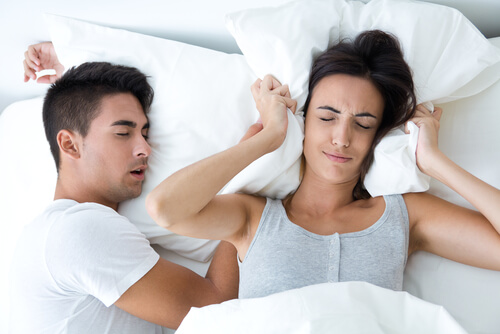 If your partner has told you that you stop breathing while you are asleep, you likely suffer from sleep apnea. While sleep apnea is easily treatable, many fail to recognize that it is a problem until it is too late.
If your partner has told you that you stop breathing while you are asleep, you likely suffer from sleep apnea. While sleep apnea is easily treatable, many fail to recognize that it is a problem until it is too late.
What Is Sleep Apnea?
Sleep apnea impacts your breathing while you sleep. Breathing is either shallow or it is temporarily interrupted. The pauses in breathing can last between 10 and 20 seconds. Sometimes they can occur hundreds of times per night. During an episode of sleep apnea, the oxygen in your blood drops and your brain halts your sleep. This often creates a choking sound or a gasp. Those with sleep apnea rarely remember these awakenings.
There are three different types of sleep apnea, they include:
Obstructive sleep apnea – It causes a blocking of airflow when your throat’s soft tissue relaxes while you sleep. The result is loud snoring and pauses in breathing.
Central sleep apnea – Occurs less often and involves the brain’s interaction with the central nervous system. The brain doesn’t signal to the muscles to moderate breathing. As a result, pauses in breathing occur. Those who suffer from central sleep apnea rarely snore, therefore, it is harder to detect.
Complex sleep apnea – It is a blend of both central sleep apnea and obstructive sleep apnea.
Effects of Sleep Apnea
Sleep apnea interrupts your regular sleep rhythm. It can cause you to spend much more time in “light sleep” instead of the REM sleep that you need. Without REM sleep, your body won’t restore itself and you’ll feel sluggish and tired the next day. Sleep apnea can cause other severe health problems like high blood pressure, stroke, heart disease and diabetes.
Sleep Apnea Treatment
You should see a doctor if you have a shortness of breath that awakens you from your sleep, if you snore loudly enough to disturb yourself or if you suffer pauses in breathing while you sleep. You should also seek sleep apnea treatment if you experience drowsiness during the day.
There are a number of therapies available. One of the most common is continuous positive airway pressure (CPAP). This involves the use of a machine that sends air pressure through a mask placed over your face while asleep. It keeps your air passageways open to prevent apnea as well as snoring. This is by far the most common sleep apnea treatment method.
Share Tweet Email If you’ve been looking for a permanent treatment for snoring that doesn’t involve surgery or sleeping with a medical device, Elevoplasty® treatment is an option you may wish to consider. What Is Snoring? Snoring is the rattling sound which occurs when a patient breathes in air and the relaxed tissues of the throat vibrate. […]
Share Tweet Email What condition only affects sufferers when they sleep, yet has the power to ruin their entire day? The answer is sleep apnea. Even though it’s only noticeable when someone sleeps, the effects aren’t limited to the hours when someone is in bed. Read on to learn how sleep apnea has a negative affect […]
